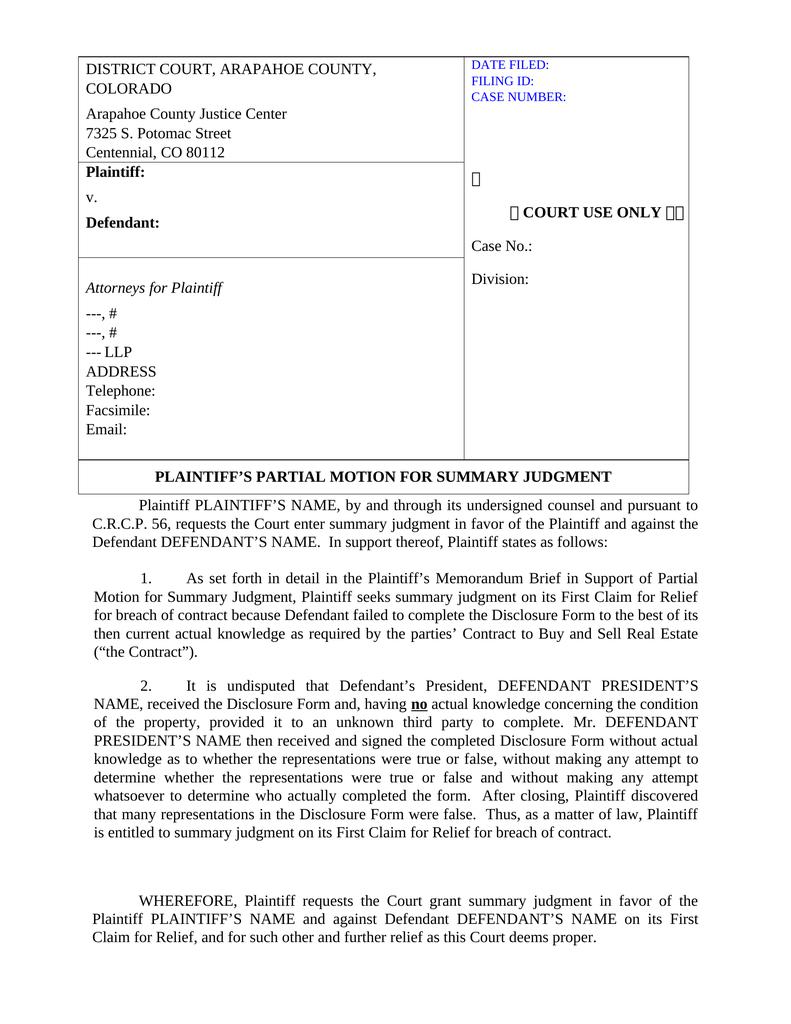
#MOTION FOR SUMMARY JUDGMENT EXAMPLE TRIAL#
Lawsuits generally go to trial because the parties disagree about the facts of a case. Therefore, an attorney who understands the applicable case law related to the underlying claims and can navigate the waters of deep legal research is paramount to filing and winning a motion for summary judgment. A summary judgment determination by the court relies mainly on the law. However, it is mostly filed by the defendant. So, who can file a motion for summary judgment? A summary judgment motions can be filed by any party in a case under Federal Civil Procedure Rules to bring an end to claims, counterclaims, or cross-claims. Therefore, the case can be decided on the law alone. A motion for summary judgment may be filed when one side believes that the evidence gathered during discovery shows that there is no longer any dispute left in the facts. If you decide to ask the court for summary judgment, you must file the Defendant’s Motion for Summary Judgment with the court where the case has been filed and send a copy of the Motion to the State (and any other parties to the case).A motion for summary judgment is when a defendant in a case, either the plaintiff or the defendant, asks the court to end the case without holding a trial.

At the end of your Motion, you should specifically ask the court for summary judgment in your favor. The Motion must specify each reason you believe the court should grant you summary judgment. The form in this toolkit titled "Defendant’s Motion for Summary Judgment" is the form you would use to ask the court for a summary judgment. For example, if you need a statement from someone who is out of town, you can tell the court why the evidence is unavailable until a certain date and the judge may extend the deadline.Ĭourts rarely grant summary judgment, but you can also request summary judgment if you believe there are no disputed facts in the case. You can ask the court for more time to file your Response or supporting evidence if you give good reasons in an affidavit or sworn motion. The Response and any evidence that you rely on in your Response that is not already on file with the court must be filed and served on the State at least seven days before the day the judge has scheduled for the summary judgment hearing. ask that the court deny the State’s Motion for Summary Judgment.list facts that you disagree with and provide your own supporting evidence (which you should attach to your response) showing why the State is not entitled to judgment as a matter of law and.explain everything you object to in the State’s Motion for Summary Judgment and in the State's supporting evidence.For example, you may want to challenge whether the State can meet its "burden of proof" (see Question 17) to show that your property was contraband and should be forfeited. The Response must contain all the facts and information you are relying on to argue against the State’s Motion for Summary Judgment. You can change the form to include more than one reason the court should not give the State summary judgment. The form in this Toolkit titled "Defendant’s Response to Plaintiff’s Motion for Summary Judgment" is the form you would use to respond to a State’s Motion for Summary Judgment. The Texas Rules of Civil Procedure require that you file a written response to the State’s Motion for Summary Judgment at least seven days before that hearing date. The judge will then schedule a date to hold a hearing on the Motion for Summary Judgment. If the State files a Motion for Summary Judgment, you will receive a copy.

If you disagree with any facts that the State makes in its Motion for Summary Judgment and you have evidence to prove that there is a disagreement, then there are likely facts in dispute and the case should continue on to trial. The State may decide to ask the court for summary judgment, which means that the court decides in favor of the State before the case goes to trial because there is no argument about the facts surrounding the seizure, and the law is in the State's favor. The court can only grant the State summary judgment if there are no "disputed facts" in the case and the court believes that the State is entitled to judgment as a matter of law.


 0 kommentar(er)
0 kommentar(er)
